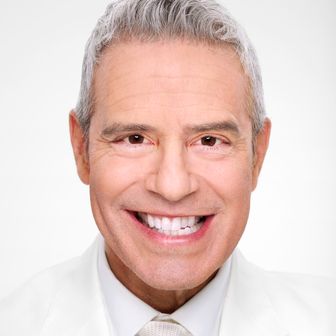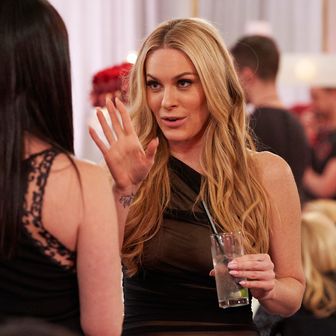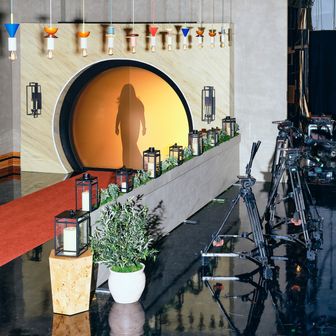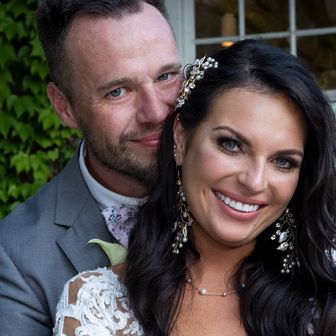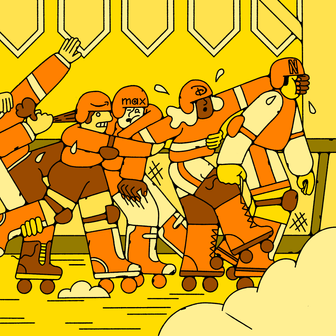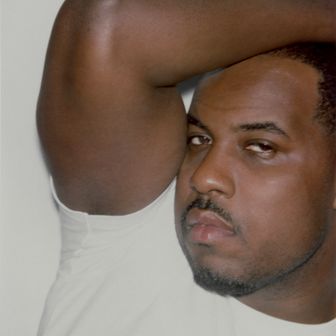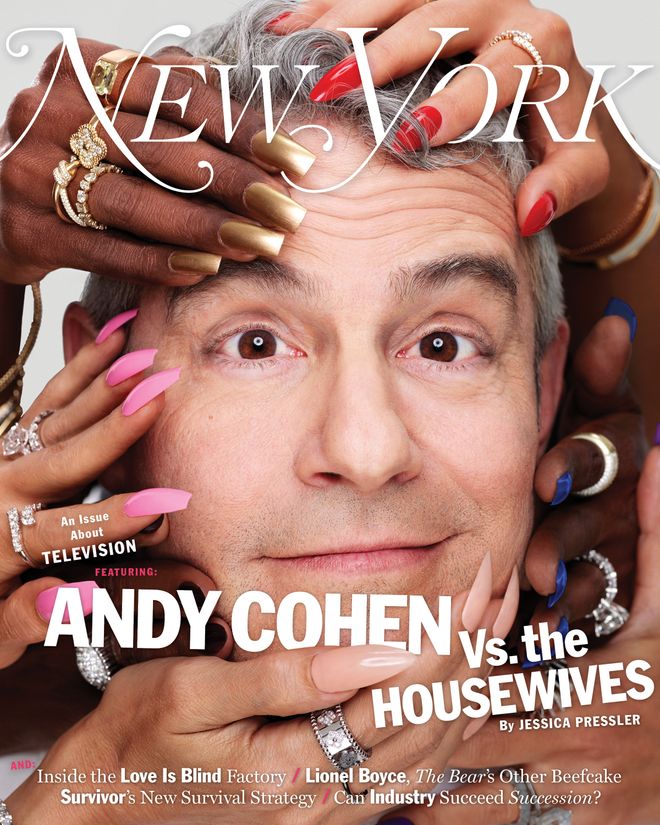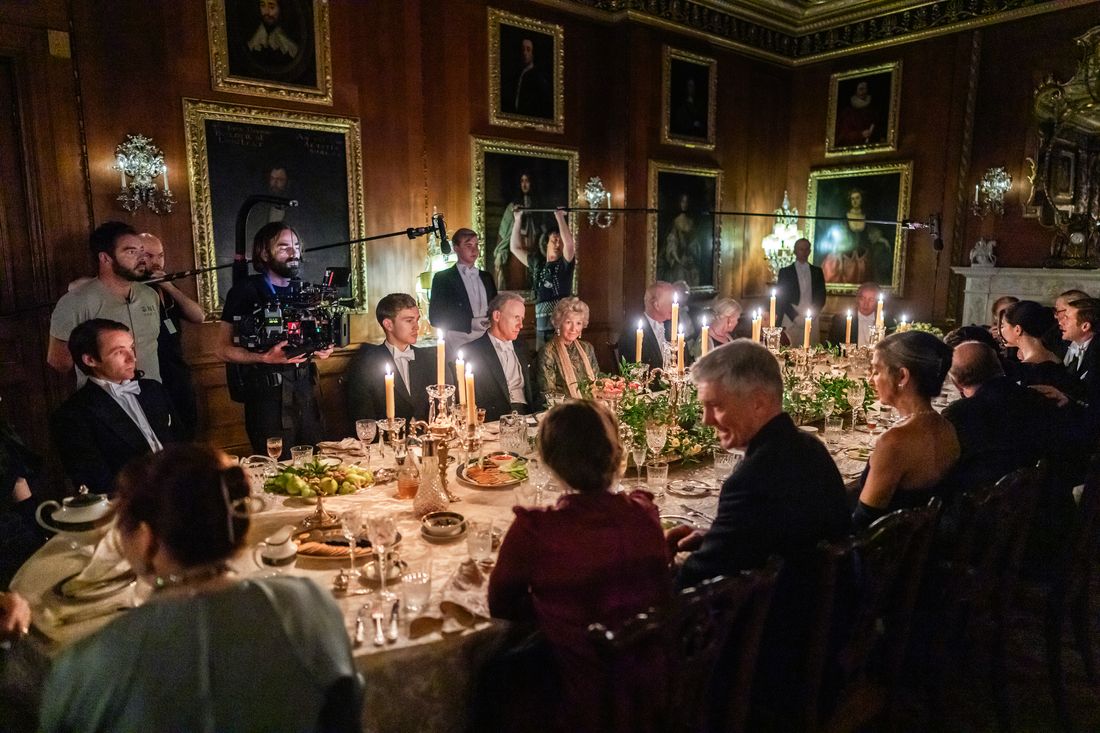
This article was originally published on June 5, 2024 as part of our 2024 TV issue. We are recirculating it now timed to Industry’s season-three premiere.
Nestled in the rolling hills of South West England, among picturesque towns with country cottages that sell for millions of pounds, there’s a 16th-century private estate known as Longleat House. The country seat of the Marquess of Bath, it is also, for a few days in late summer 2023, the filming location for a sex-and-drug-addled TV show about misbehaving investment bankers. Bedecked with antique furniture and genealogical tapestries, the home is a significant change of place for a clique of self-destructive 20-something co-workers more often surrounded by the glass-and-fluorescent despair of their highly competitive London offices. Don’t worry: They still find a way to do coke there.
At the end of Industry’s third season — a level up for the series in terms of scale, writing, and general shenanigans — a few of its characters end up at this monument to old money for a dinner party. There are two familiar faces present in this scene, both wearing black tie: Harry Lawtey, who plays Industry’s woebegone working-class striver, Robert, whose boys’-club looks — fine cheekbones, a winning curl of hair Industry’s makeup designer, Mirna Curak, tells me she is personally very protective of — allow him to fit into the banking world, and Marisa Abela, who plays Yasmin Kara-Hanani, a British Israeli Libyan heiress who is as good at social manipulation as she is bad at her actual job.
In This Issue
More From
the Television Issue
See All
There’s a third familiar face, too, though not one we’ve seen on the series before: the dapper Kit Harington, a veteran of Game of Thrones, wearing the trademark powder-blue bow tie of the Bullingdon Club, the famed, hyperexclusive Oxford men’s group. He sits to Abela’s left in his new role as Henry Muck, a green-energy start-up founder introduced this season who is the epitome of a posh twit. Robert has long lusted after Yasmin, while she has tortured him emotionally, psychologically, and sexually. Back in the first season, she handed him her panties during an office happy hour, then made him orgasm on a mirror and eat the ejaculate during the company holiday party. When Henry Muck enters the picture, Robert and Yasmin’s relationship gets more complicated. Robert is assigned to work with Henry on his company’s IPO; Yasmin becomes the object of Henry’s interest. It’s the kind of story you could see only on Industry, colored by class resentment, water sports, and a scandal about Yasmin propagated by this universe’s version of the Daily Mail. Henry’s uncle is, of course, its publisher. This is his mansion.
Even in these intimidatingly swanky digs, as a representative from Longleat reminds the actors to please not leave crumbs on the table, members of the Industry crew operate like they’ve stolen the keys to Daddy’s Porsche (Daddy, in this case, being Warner Bros. Discovery). The show’s creators, Mickey Down and Konrad Kay, are directing episodes for the first time this season, and they’re huddled behind their monitors doing the shaka hand gesture to each other when they like a take. Candles light the scene, they tell me, in an homage to Stanley Kubrick’s 18th-century-set bro epic, Barry Lyndon. A background actor stands beside a cart full of upmarket dairy products, and because of the heat of the people and the candles, the room smells strongly of melting cheese. Lawtey nails one take — a close-up that involves Robert, once again, being subjected to emotional terrorism — then suggests he could be even better. Another take, and he is better. I watch the monitor, and it’s like his face is shattering onscreen.
Industry can be difficult to describe — I often resort to telling people it’s finance Skins, or as if Michael Mann directed Gossip Girl. Harington is the series’ biggest name yet; the fact that he’s returning to HBO for this show in particular looks like an implicit acknowledgment of its growing appeal. The series’ audience is relatively small but generally vocal; it’s a show for your favorite TV fan’s favorite TV fan. There’s a glow-up at play that’s apparent even in its release schedule: The first season premiered in November 2020 and dropped the second half of its episodes all at once in a bid to promote the streaming service then called HBO Max; the second still aired on Monday nights, the stepchild of the HBO scheduling week; but the third, arriving on August 11, is getting that coveted marquee Sunday-night slot, post–House of the Dragon, where Succession used to be. “That’s prime real estate and we’re capitalizing on it,” HBO’s head of drama, Francesca Orsi, told me. “We’re happy for them; they deserve that spot.”
There’s another dynamic at play. In the wake of the American WGA and SAG strikes, Industry, which is filmed on British contracts like House of the Dragon and did not stop production, is entering a market with less competition. In fact, HBO may value it more than ever. The network lacks an open-ended contemporary dramatic hit of the kind in which it typically specializes. Succession has ended. Euphoria is on indefinite hiatus. The White Lotus is still filming in Thailand. “In the old days, when the landscape of TV was very different, HBO shows didn’t hit until the third season, whereupon they started to fly,” Industry executive producer Jane Tranter tells me. “I’m hoping the audience will maybe open up a bit because we’d love to make some more.”
Industry has grown and changed as a series, but it has also bent television to its will by remaining true to its own jargon-and-blow-blurred view of humanity. Before Harington joined the show, he was already an Industry aficionado. On a call a few months after filming had wrapped, he told me he’d started watching it while on lockdown during the pandemic. “Tonally, it’s one of the most unique shows out there,” he said. “I love that they are like, We’re going to drop you in this and trust you’re smart enough to keep up.” When he heard it was looking to cast a new role, he reached out through his agent, sat down with the creators, then got the invite to come aboard. “In Game of Thrones, we had actors come in who were fans of the show,” he told me. “Now it was the other way around and I was fanboying over the actors in Industry.” It’s the kind of dealmaking a good trader would endorse: Maybe the show has just as much to offer Harington as he does it.
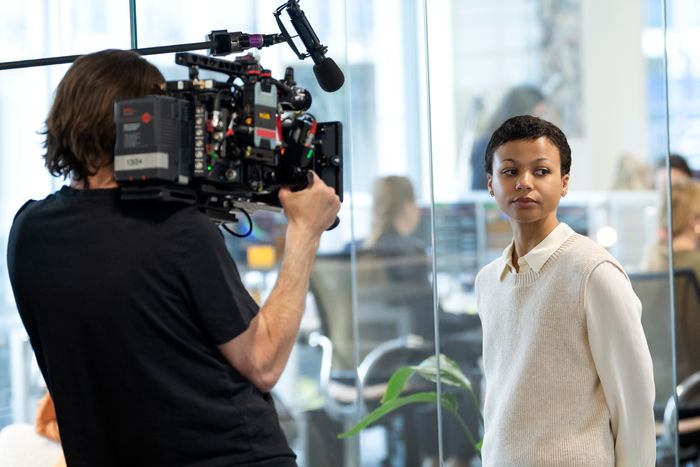
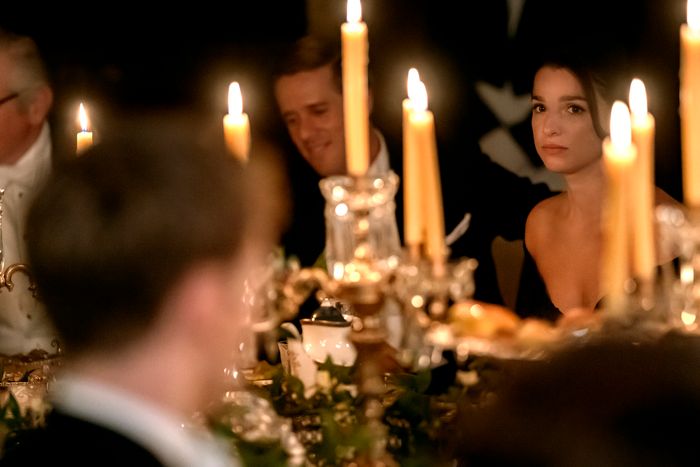
A few months later, on the opposite side of the Atlantic, I get coffee in Boerum Hill with Industry’s token American representatives: Myha’la, who plays the paranoid, power-hungry rising star Harper Stern, and Ken Leung, Harper’s mentor-slash-adversary Eric Tao. The series kicks off with Harper as its point of entry: She arrives for an interview in the pilot at the British outpost of a fictional American bank known as Pierpoint & Co. (think Goldman Sachs, Merrill Lynch, or JPMorgan but somehow more evil), bluffing her way into a job alongside Yasmin, Robert, and some other grads, even though she’s faked her college degree. Eric, another outsider who’s wormed his way into the power structure, takes Harper under his wing, and the two engage in a prolonged financial folie à deux. At the end of the first season, she feints in the direction of betraying Eric but then sells out another Pierpoint higher-up instead. At the end of the second, when Harper falls under the spell of a corrupt hedge-fund exec played by Jay Duplass, Eric turns on Harper. He knifes her in the back in the finale by revealing her fake degree to Pierpoint’s HR. (You may be thinking, They have an HR team?) She is summarily fired.
Down and Kay intentionally wrote themselves into a corner with that cliffhanger and briefly considered leaving Myha’la off the show’s marketing materials. But then they realized that would be a bridge too far in terms of toying with the audience. Rest assured Harper is back with a vengeance in Industry’s third season. She and Eric start off far apart, but their connection is more unhealthily obsessive than ever. Harper manages to scrounge up a job at an ecologically conscious American investment firm, a brutal parody of corporate greenwashing, where she meets a new mentor, Petra, who is equally as ruthless as Harper though slightly more principled. She is played by Barry standout Sarah Goldberg, another actor who came to the show as a fan. Eric, meanwhile, tries to be more involved with Robert and Yasmin at work, looking for (and failing to find) a Harper replacement. “I would remind myself, All the things she’s done up to this point have been linked to this person,” Myha’la says of filming a pivotal season-three moment when they finally do cross paths. “All the choices she’s making are fueled by the fact that she’s not in the office with him.”
In person, Myha’la and Leung evince a lot of that same closeness, though in more positive terms. Off the clock, Myha’la retains some of Harper’s intensity but with all the amiability her character lacks, while Leung tends to be more introspective. Three seasons — and more than half a decade — into working together, the two can communicate in shorthand. “I feel so safe with you,” Leung says. “It’s an easy day when we’re together on the call sheet.” They met in the U.K. while doing a reading of the show’s pilot, where Leung was the resident old hand with a career in film and theater. Myha’la, like many of the show’s stars, was just out of drama school. “You were — well, I was perceiving you as — cool as a cucumber, wearing all-white linen, smoking a cigarette, leaning against the wall,” she says. “And I was freaking out like, I don’t know what I’m doing here!” “I don’t remember the freaking out,” Leung says. “I just remember the energy.”
The way that Industry has zeroed in on that Eric-and-Harper dynamic is indicative of the fascinations, as well as the growth, of the show. Down and Kay had not originally envisioned a Black woman for Harper’s role. They had always considered having an American outsider at the bank as a point of entry — a useful way to explain things to American viewers — possibly a woman. After some early conversations in their first writers’ room, they decided to make Harper Black. When they cast Myha’la, Harper was written as more outwardly anxious than the version you see onscreen. It didn’t ring true to her as the way a young Black woman would act. “My understanding was, as my mom once told me, to never let them see you sweat because you’re already disadvantaged,” Myha’la says. “I was like, ‘What if she comes in being like, “I’m the baddest bitch you’ve ever met?”’” It changed the calibration of the character — Harper’s still defensive and anxious on the inside, but she does all she can to never let her guard down.
That colors the bond between Eric, an Asian American man, and Harper, too; both are marginalized, in similar and different ways, within the larger western imperial power structure. In a workplace, they’re expected to be helpmeets while also being held up as tokens of acceptance, a dynamic the characters bridle against and use to their advantage. Industry itself lacks much piety about the feel-good ethos of corporate-inclusion initiatives. Eric, in a board meeting early this new season, rolls his eyes at Pierpoint’s 150th-anniversary celebrations and points out that the founders came from a slave-owning family. “They’ve connected in being two people coming from a less-advantaged position now in a whole other country trying to fight to be at the top of the game,” Myha’la says. “I don’t know what it is, but I feel like I have it too — some weird internal survivor’s guilt. This understanding that my life could look so different, but it doesn’t. I feel like she — and sometimes I — feel like I’m one misstep away from the end of my life as I know it.”
The writers bent story lines toward the strengths of their other actors too. Abela’s Yasmin was always conceived as a bit of a princess, the kind of privileged girl who flounders in a highly competitive workplace but can’t be easily let go, given her family connections. Abela delights in the comedy of Yasmin’s privilege, even if she has to work hard to keep up with the running gag that Yasmin can speak several languages (Arabic, Spanish, French, etc.). But Abela pushed to give the character more social savvy and an intriguing streak of cruelty. In early scripts for the first season, Yasmin was looking for validation from Robert, and he was the one telling her what to do with her panties. Abela advocated for her character to be turned on by control. “I think she felt pretty good about herself physically, and in those moments, she wanted to feel powerful, not beautiful,” Abela told me, “and they really let me go there with that.” The scenes were rewritten so that Yasmin was the one telling Robert what to do, a dynamic that continues to flourish in the third season. “In season one, the writing basically had to catch up to our actors’ standard,” Kay told me. “One of the great prides of our career is that this is all their first major thing.”
Indeed, Industry has launched its lead actors to new levels of fame. The show might not yet be as talked about as HBO’s similarly outré Euphoria, but its trio of leads are all booking bigger work. Myha’la has appeared in the Gen-Z slasher Bodies Bodies Bodies and the Julia Roberts thriller Leave the World Behind, Lawtey across from Christian Bale in The Pale Blue Eye and with Lady Gaga in the upcoming Joker sequel, Abela as Amy Winehouse in Back to Black and in an upcoming Steven Soderbergh movie. It’s the sort of thing that makes Lawtey — who, like Robert, wears his heart on his sleeve (though Lawtey is clearly much more with it) — a bit sentimental. He, Myha’la, and Abela bonded early on in the filming of the first season, taking a trip to Brussels together on the Eurostar — “a crazy weekend in the home of European diplomacy” — when Myha’la needed to leave Great Britain and return in order to renew her visa. “The fact that we’ve been able to grow together through the show, and then go off and have our own singular experiences between seasons, has been so special,” he tells me. “There’s a very supportive network for the three of us in our little WhatsApp group.”
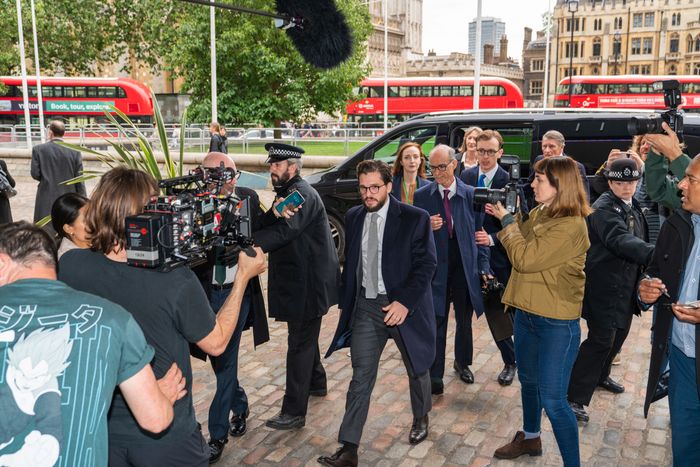
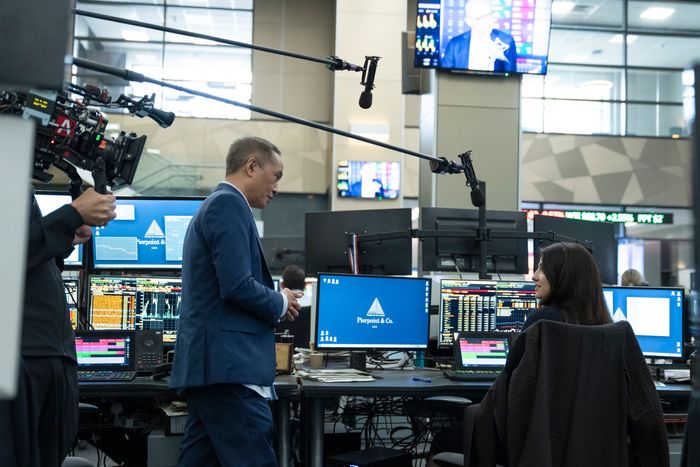
Though you can supposedly see the dome of St. Paul’s Cathedral in Central London through the glass windows of the trading floor, the actual offices of Pierpoint & Co. are located on a soundstage in the rehabilitated dockyards of Cardiff, Wales, two hours away by commuter train. In recent years, thanks to government-supported incentives, available labor, and real-estate prices, the postindustrial Welsh capital has become a hub for TV production. Industry films a few exterior scenes on location in London, but the cast and crew decamp to Wales for a few months every few years to get the bulk of the job done. “Cardiff has a very special place in my heart. I love it,” Lawtey says. “I think I’m the only one who does.”
Industry’s primary set is a replica of an actual office, convincing to the point that cast members joke it feels as if they clock in for office jobs. Executive producer Kate Crowther gave me a tour of Pierpoint that was reminiscent of an executive at a bank showing off their workspace. In the universe of the series, the firm is celebrating that 150th anniversary, so it has added a streak of bronze along the fake marble walls. The company is trying to go for a socially conscious rebrand — thus the investment in Henry Muck’s green-energy firm — so there’s new art in the meeting rooms and a pointedly visible HR packet about diversity, equity, and inclusion lying in a break room. Office life in all its mundanity has been carefully replicated. A note in the kitchen asks that someone please stop stealing their sandwiches: WE ARE FULL-GROWN ADULTS, NOT CHILDREN.
Each desk on the floor has its own Bloomberg terminal, the several-monitor hydras of screens that are the preferred workspace of the financial class. Industry’s terminals, Crowther brags to me, are all fully functional, installed with the consultation of the company itself, and Pierpoint’s stock ticker works too. Flip a switch and you get all the real-time financial information you need, straight to Cardiff. The desks themselves contain character-specific props — one of this season’s new hires, nicknamed Sweet Pea, is a Gen-Z influencer armed with a jade roller and a tripod for her phone. It’s easy to see how the fiction of the world can blend with the reality of the actors performing it. Industry has employed the same set of local background actors across its seasons, all of whom have their own assigned desks. They show up for work and sit for a day of filming as if they were at office jobs. Some have started to date each other.
That level of realism forms the backbone of Industry, a show that evolved with a significant degree of improvisation around a rock-solid understanding of its own sleek but acrid vibe. That realism stems from Down and Kay’s background in finance. The two creators met during their time at Oxford, where they were assigned to the same college. Both the high-achieving children of immigrant parents — Kay’s mother is Polish, Down’s is Ghanaian — they worked together at the school paper covering movies. But without a clear direction in mind, when college neared an end, both ended up taking jobs in finance by default. “I had no intention of working in banking and a very cursory interest in filmmaking and writing,” Down says. “But when we got to the end, everybody was getting jobs in banks and I thought, I’d better get one.”
Down only lasted for a summer as an intern in private wealth management for a big American firm and about a year at a European firm. Then, reverting to that interest in filmmaking, he took a job as an assistant to a talent agent and started writing short scripts on the side. After Kay was laid off from Morgan Stanley, the two decided to try their hand at writing together. Around the same time, Tranter was mulling an idea about finance herself. In 2015, she set up an independent TV-production house named Bad Wolf, a reference to Doctor Who, which, in her previous work as an executive at the BBC, she had a key role in reviving. In 2013, 21-year-old German intern Moritz Erhardt had died from an epileptic seizure while employed at Merrill Lynch (in the pilot of Industry, a new hire dies on the job at Pierpoint). Tranter, after reading about that story, became fascinated by the question of why bright young university grads would throw themselves into such a brutal career. “This generation were meant to be saving the ruins that my generation had left them in,” Tranter, who tends to cut right to the point, told me. “So why the fuck are any of them going to work in these big American banks?”
Tranter and her team started collecting accounts from people employed in finance and trying to figure out a way to crack the story of young grads at work that wouldn’t turn into a Wall Street–style “Greed is good” glamorized spectacle but wouldn’t end up being boring, either. Then, as she pondered who might write this series, “as if by magic, arriving on a velvet cushion,” she heard about Down and Kay. The two had taken a meeting with Tranter’s associate Ryan Rasmussen at Bad Wolf for another pitch they had, decidedly not set in “the City,” as London’s financial district is called. “To be brutal, it was the way they talked about their experiences, more than any piece of work they’d written, that made me think they could do this,” Tranter says. “At the very least, we were going to get something authentic. At the most, I loved the way they talked and spoke. What I hadn’t anticipated was how much and how quickly they would grow.”
Fittingly for a show about money, Industry made it to television in large part owing to budgeting. While developing the idea, Tranter secured some interest from Casey Bloys, who became the head of HBO programming in 2016 and was looking for a good show at a very low cost. Though the characters on Industry are making a lot of money, it wouldn’t take that much to film their lives: You could cast unknowns as the leads, hire new writing talent, and shoot it primarily in standing sets in office spaces. (The budget has not changed significantly, Tranter tells me proudly, even in the seemingly more sumptuous third season; they scrimped and saved to book that trip to Longleat.) In 2019, HBO announced plans to film a pilot about young adults in finance directed by Lena Dunham. Tranter politely but firmly describes Dunham’s involvement as minimal, saying she was fulfilling a contractual obligation with the network to direct and that she had a hand in the casting process, helping to identify the young actors who could carry the series.
Over those several years of development, a sort of master’s program in TV-writing structure for Down and Kay, they began to home in on the elements of the show that became the essential fascinations of Industry. That question Tranter was asking — what makes a person so obsessed with winning they throw themselves into the belly of capitalism? — started to get an intriguingly complex answer. Underneath the interpersonal mess of Pierpoint, there’s some weird thrum of power. You can sense it in the flow of money through those terminals but also in the jockeying for position among the grads. The very fact that their job is so toxic, that half their co-workers will be fired before the end of their first year, makes it all the more satisfying to be the ones to survive. Down and Kay’s first draft of the pilot, written when they were pissed off at the banking industry, was awfully bitter. An executive at HBO asked what they got out of being on the job in the first place. There’s buzz to it, Down realized. “That adrenalized buzz is powerful,” Kay says. “We try to give it to the viewer.”
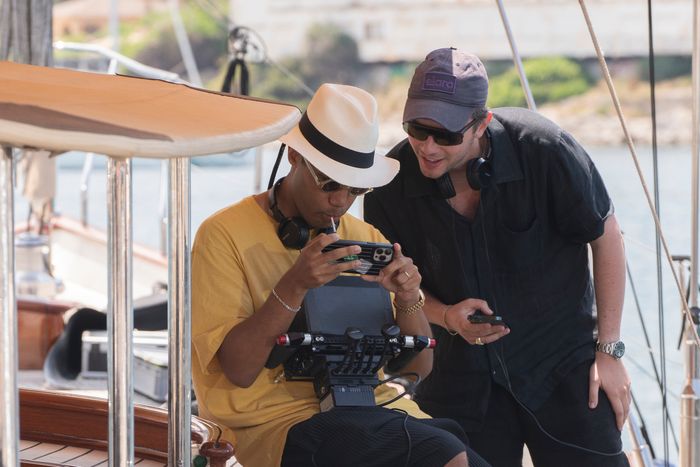
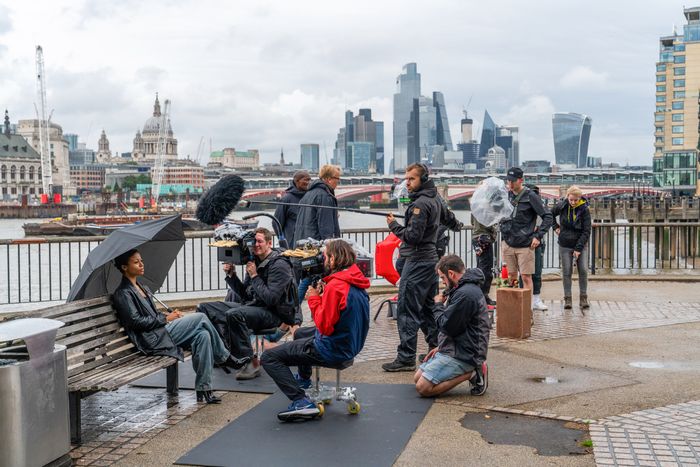
Pierpoint & Co.’s biggest buzz addict may also be Industry’s fan favorite Rishi Ramdani, played by Sagar Radia. He’s a trader who holds court over the office floor with his own brand of color commentary and very off-color jokes. Rishi’s dialogue, much of it added into Industry’s distinctively busy soundscape via ADR near the end of production, tends to contain some of Down and Kay’s most niche references. “People come up to me and say, ‘We love your lines off-camera!’” Radia says. “I’m not sure whether to be offended by that or not.”
Those viewers, however, might be elated to learn that Rishi is not only heard but very much seen in Industry’s new season. The character gets a stand-alone episode that has all the mania of Uncut Gems. Rishi is a hyperspecific type who’s also immediately legible as “that guy” from any workplace. It’s that kind of quality that makes Industry excel. Even if you don’t understand the specifics of this world, the show races forward as if you do and has the confidence to carry on chasing after its own interests. Kay and Down, with the help of their heads of department, tend to be exceedingly particular about the details: the movies the characters watch (this season has a joke about dating a guy with a Mubi subscription), the places they go (a season-two American newcomer is doomed from the moment he mentions wanting to go a pub that’s like Harry Potter), and especially what they wear. This season’s costume designer, Laura Smith, told me she likes to sit incognito in the City and observe who is wearing what. It’s important to know that, traditionally, you wear Hermès if you’ve gotten a promotion and that Silicon Valley’s pseudo-casual vest culture has started to upend those old traditions. That penchant for verisimilitude can run up against Industry’s delight in debauchery simply on a logistical level. Certain luxury brands don’t want to be associated with drug use, according to Crowther, so a character must fully remove his tie before he does a line.
Down and Key tend to be self-critical about their own work, but they acknowledge that it came on strong with that essential, sticky buzz that can hook a viewer, a feeling amplified by Nathan Micay’s electronic score. “You can take what you want from the show,” jokes Down. “Maybe you want an in-the-weeds business story line. If you like sex and drugs, you get that. Plus good music.” “You can second-screen it very well,” Kay adds. “I reckon 10 percent of the audience listens to the dialogue.”
The buzz, so to speak, is meant to be even louder this time. In Down and Kay’s estimation, after Industry’s rookie outing, the second season had more structural clarity but a tendency to be neat: Harper’s traumatic backstory comes by way of an episode where she runs into her brother, an addict, in Berlin. “It was us thinking we’re making a drama for HBO,” Down says. “God, it was heavy.” When writing the third, they tell me, they talked in their writers’ room, which includes both playwrights and finance vets, about combining the maniacal energy of the first with the structural solidity of the second. Their initial vision of the new season was a single gesture, which Down suggested to Kay: Eric getting a wedding ring sucked off his finger. “I thought, God, we’ve got a whole season of TV based off that one image,” Kay says.
Now that I’ve watched it, the success of that hybrid is apparent. The season centers on one big deal, the IPO of Harington’s character’s energy start-up, which makes the business stakes clearer, as well as its consequences, given that actual people will suffer in an energy crisis. But the show also revels in the sensational. Eric spirals into sex and drugs. The comedian Joel Kim Booster, another big Industry fan, makes a nude appearance in a sauna. Yasmin’s father’s scandal is explained via flashbacks to her time with him on a yacht in Mallorca, which the creators filmed on an actual yacht in Mallorca. They pitched the idea to HBO with the email subject line “coke and boats.”
Is that enough to make Industry, finally, a breakout hit? Positive indicators in the market might have you leaning “yes,” though a good analyst would say anything is possible. To be clear, Industry does already have an audience. And given the series’ cheapness, HBO has gotten bang for its buck. Cast members have been approached by actual bankers hoping to talk shop — “They go, ‘I’m in finance,’” Leung says. “I go, ‘Oh, so we have nothing in common.’” Though there are also fans with lives outside Fidi and the City, whether they’re lords who live in stately homes (the Marquess of Bath, according to Industry location manager Jason Keatley, watched the series before he approved of the shoot) or Gen-Zers who covet the show’s most distinctive emblem: the deep-purple PIERPOINT & CO. sweatshirt, now available for purchase through HBO. If Industry’s third season does become a true hit, it would be despite the fact that the series’ tastes run contrary to the prevailing kinds of television being made today. The show is adult, in content and form, and not based on any IP. It’s not full of movie stars.
It’s old hat to compare television to novels, but Industry closely resembles the sprawling 19th-century serialized fiction of London. Anthony Trollope wrote about scheming bankers and charlatans too. These ones just have access to ketamine. “We always find ourselves, as writers — let’s put it this way — period-drama adjacent,” Kay says. “We’ve always liked the old British class literature.” Perhaps that’s why Down and Kay have ended up in that mansion in the first place. “In the U.K., we talk about social mobility, the erosion of class divides,” Kay says, “but Mickey and I think it’s more entrenched than ever.” Those old-fashioned dynamics come to the fore when Yasmin, in the wake of her father’s scandal, finds herself grasping for financial and emotional stability. There’s Robert, who offers the prospect of puppy love but is not of her class, and Harington’s Henry Muck with all the — crucially, old — money in the world. Described that way, the terms of the season are nearly Victorian: a courtship plot. “Nothing you’re about to watch here is new,” a character announces late in the third season, which pithily captures the way Industry’s young hotshots stumble into the gears of old and powerful forces. Can they tame them? You, as a viewer, may hope so, but don’t bet on it.


